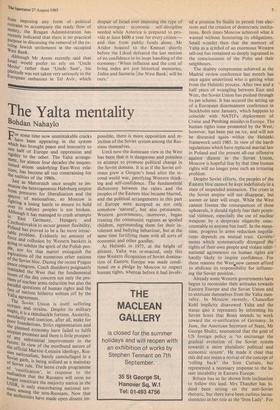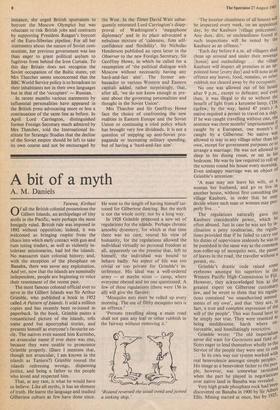The Yalta mentality
Bohdan Nahaylo
For some time now unmistakable cracks have been appearing in the system Which has brought peace and insecurity to One half of Europe and oppression and rigidity to the other. The Yalta arrange- Tent, for almost four decades the unques- tioned axiom underlying East-West rela- tions, has become all too constraining for the realities of the 1980s. Just as Metternich once sought to im- munise the heterogeneous Habsburg empire from pressures for liberalisation and the i spectre of nationalism, so Moscow is fighting a losing battle to ensure its hold over its subject peoples is not broken. Although it has managed to crush attempts In East Germany, Hungary and Czechoslovakia to secure greater flexibility, otPoland has proved to be a far more intrac- ,able Problem. Evidently no amount of force and collusion by Western bankers is going to subdue the spirit of the Polish peo- ple, nor for that matter extinguish the aspirations of the numerous other nations of the Soviet bloc. During the recent Prague Peace congress, Czech dissidents poignantly reminded the West that the fundamental issues of the day concern not only the pro- blem of nuclear arms reduction but also the parallel questions of human rights and the fate of nations hitherto written off by the Yalta agreement.
The Soviet Union is itself suffering stresses and strains. Despite its military might, it is a ramshackle fortress. Austerity, mend ; actty and coercion, after all, make for
Poor foundations. Strict regimentation and the Planned economy have failed to fulfil utopian promises and there is little prospect any substantial improvement in the 'Inure. In view of the moribund nature of e official Marxist-Leninist ideology, Rus- s2an nationalism, barely camouflaged in a Soviet garb, is being utilised as a mainstay of Soviet rule. The latest crude programme of 'russification', in response to the
longer that the Russians will soon no
sfonger constitute the majority nation In the SSR, is only exacerbating national ten- among the non-Russians. Now that the authorities have made open dissent im-
possible, there is more opposition and re- jection of the Soviet system among the Rus- sians themselves.
Until now the dominant view in the West has been that it is dangerous and pointless to attempt to promote political change in the Soviet domain. It is as if the Soviet col- ossus grew a Gorgon's head after the se- cond world war, petrifying Western think- ing and self-confidence. The fundamental dichotomy between the rulers and the peoples of the Eastern bloc became blurred, and the political arrangements in this part of Europe were accepted as not only somehow 'natural', but also permanent. Western governments, moreover, began treating the communist regimes as spoiled children, reprimanding them for their in- tolerant and bullying behaviour, but at the same time fortifying them with all sorts of economic and other goodies.
At Helsinki in 1975, at the height of detente, Yalta was re-enacted, only this time Western recognition of Soviet domina- tion of Eastern, Europe was made condi- tional on a pledge by Moscow to respect human rights, whereas before it had involv- ed a promise by Stalin to permit free elec- tions and the creation of democratic institu- tions. Both times Moscow achieved what it wanted without honouring its obligations. Small wonder then that the memory of Yalta as a symbol of an enormous Western sell-out has remained so deeply ingrained in the consciousness of the Poles and their neighbours.
The shabby compromise achieved at the Madrid review conference last month has once again underlined who is getting what from the Helsinki process. After two and a half years of wrangling between East and West, the Soviet Union has pushed through its pet scheme. It has secured the setting up of a European disarmament conference in Stockholm next January, which happens to coincide with. NATO's deployment of Cruise and Pershing missiles in Europe. The human rights issue promoted by the West, however, has been put on ice, and will not be discussed again within the Helsinki framework until 1985. In view of the harsh regulations which have replaced martial law in Poland and the present all-out offensive against dissent in the Soviet Union, Moscow is hopeful that by that time human rights will no longer pose such an irritating problem.
Despite Soviet efforts, the peoples of the Eastern bloc cannot be kept indefinitely in a state of suspended animation. The crises in the Soviet empire will not disappear, but sooner or later will erupt. While the West cannot foresee the consequences of these upheavals, it should rightly fear their poten- tial violence, especially the use of nuclear weapons by a desperate oligarchy unac- countable to anyone but itself. In the mean- time, progress in arms reduction negotia- tions depends on mutual trust. GovIern-., ments which systematically disregard' the rights of their own people and violate inter- national agreements on human rights are hardly likely to inspire confidence. For these reasons the Westa,now cannot afford to abdicate its responsibility for influenc- ing the Soviet position.
Already some Western governments have begun to reconsider their attitudes towards Eastern Europe and the Soviet Union and to extricate themselves from the Yalta men- tality. In Moscow recently, Chancellor Kohl implicity disavowed Yalta and the status quo it represents by informing his Soviet hosts that Bonn intends to work toward the re-unification of Germany. In June, the American Secretary of State, Mr George Shultz, announced that the goal of US foreign policy is 'to encourage the gradual evolution of the Soviet system towards a more pluralistic political and economic system'. He made it clear that this did not mean a revival of the concept of 'rolling back' the Iron Curtain, but represented a necessary response to the la- tent instability in Eastern Europe.
Britain has so far shown little inclination to follow this lead. Mrs Thatcher has in- deed been strong on the anti-Soviet rhetoric, but there have been curious incon- sistencies in her role as the 'Iron Lady'. For instance, she urged British sportsmen to boycott the Moscow Olympics but was reluctant to risk British jobs and contracts by supporting President Reagan's boycott of the Euro-Siberian pipeline. For all her statements about the nature of Soviet com- munism, her previous government was less than eager to grant political asylum to fugitives from behind the Iron Curtain. To this day Britain does not recognise the Soviet occupation of the Baltic states, yet Mrs Thatcher seems unconcerned that the BBC World Service policy is to broadcast to their inhabitants not in their own languages but in that of the 'occupiers' — Russian.
In recent months various statements by influential personalities have appeared in the British press advocating more or less a continuation of the same line as before. In April Lord Carrington, distinguished former Foreign Secretary much admired by Mrs Thatcher, told the International In- stitute for Strategic Studies that the decline of the Soviet empire should be left to take its own course and not be encouraged by
the West. In the Times David Watt subse- quently reiterated Lord Carrington's disap- proval of Washington's 'megaphone diplomacy' and in its place advocated a nebulous mixture of 'calmness, firm self- confidence and flexibility'. Sir Nicholas Henderson published an open letter in the Observer to the new Foreign Secretary, Sir Geoffrey Howe, in which he called for a resumption of 'the political dialogue with Moscow without necessarily having any hard-and-fast aim'. The former am- bassador to various Western and Eastern capitals added, rather surprisingly, that, after all, 'we do not know enough at pre- sent about the governing personalities and thought in the Soviet Union'.
Mrs Thatcher and Sir Geoffrey Howe face the choice of confronting the new realities in Eastern Europe and the Soviet Union or continuing a tried policy which has brought very few dividends. It is not a question of stepping up anti-Soviet pro- paganda or increasing military spending, but of having a 'hard-and-fast aim'.



































 Previous page
Previous page